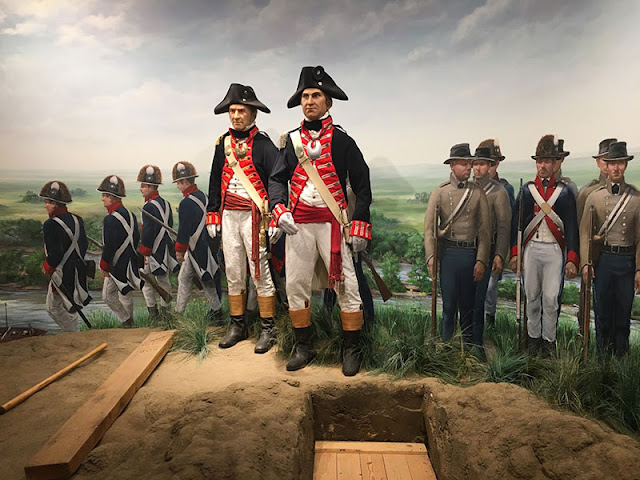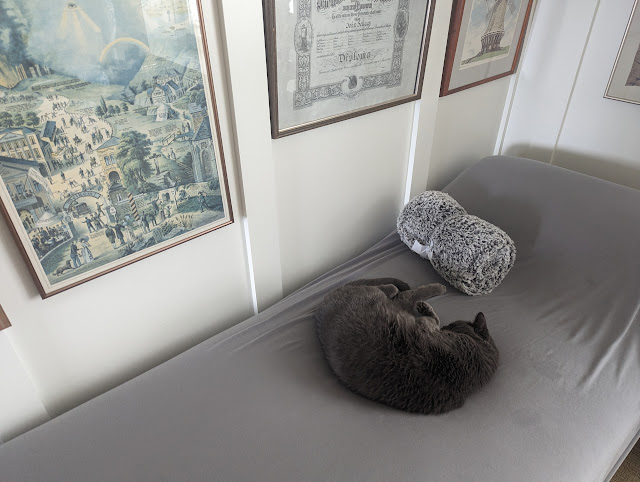To my mind, decadence surrounds a monster piece of furniture called a "fainting couch." Two morally questionable images arise; one is of some delicate Victorian lass with the back of her hand up to her forehead, feeling, well, faint. Her problems, if indeed they are real, stem from too much leisure, not the lack thereof. She's having a moment, and the lady of the manor suggests she step discreetly to a place just off the great room, where she'll find a fainting couch. It's a Downton Abby sort of thing. Oh, and add this too--this Victorian lady is far too tightly corseted.
The other image is centuries older. A paunchy bald guy wearing a white smock and a laurel wreath is aboard this long, long chair, one arm up over the pillow while being fed succulent grapes, one by one, by some comely consort, a young thing with an ample bosom.
It's all fantasy, of course--the Victorian woman and the Greek hedonist. It's all fantasy and decadence, which explains, perhaps, why they are the images that come to unregenerate me when my wife speaks of a "fainting couch."
We moved one--a real one--into our house Saturday, a big, ungainly thing that was somehow lighter than I thought it would be. Today it sits in our library, where--I must admit--it fits, well, perfectly. We just had to excuse a rocking chair, bring it to the basement. Otherwise, our fainting couch is set in a place where it could well have been since the day we moved in.
My partner (I'm using a high-fashion term) has always dreamed, maybe even decadently, of a fainting couch. I don't know why exactly. The only times I ever remember her fainting were in church, when she was just then in the family way. If she is now, at least we have a fainting couch.
We're far too old to buy new furniture. What's more, we spend far more of our time trying to figure out what to get rid of than what to import. Nonetheless, on Saturday we moved it in, a huge thing with a 3/4-cut oak base that stands on softball-sized feet that match our kitchen table's. That massive pillow makes it a fainting couch and not a day bed, I'm told.
Here 'tis, in the house from which it came, a house that belonged to an aunt (Barb's side), who today, in the Home, needs far less than she had when she lived alone in a place in town.
I could ask, but knowing the aunt who left it behind, I find it hard to believe that at her place it ever relieved any fainting. Aunt Carol worked in Orange City's Sioux County County Courthouse, where it likely did, occupying considerable space in the nurse's office.
Through the years, whatever commerce it had ever done slimmed away to nothing, at which time someone in authority determined the courthouse's fainting couch would be unceremoniously dumped. Aunt Carol sprang into action, called her husband on the farm outside of town, told him to get his pickup, because that ample piece of furniture was not going on a trip to nowhere.
Thus, it became the property of Aunt Carol, who, as I've already said, is presently at home in the Home.
Seriously, it took this non-fainting and most certainly not-with-child spouse of mine about a week to follow up a notion she'll admit she's had for years, a notion she inherited from her mother, who, Barbara claims, would have loved a fainting couch but didn't have one because she just didn't have a place for one. A week ago she saw it, but Friday, as if out of nowhere, she pulled me upstairs and said, "What would you think if I took that fainting counch?"
I don't think I'm far off the mark if I say that we now have a fainting couch because my golden anniversary-plus-one partner is satisfying an unrequited longing her upholsterer mom had for just such a piece of furniture.
If it suits you, just hold on to those decadent images--I don't mind. But be relieved to know that I won't be donning a toga any time soon, and you can bet my wife, scantily clad, won't be feeding me grapes--green or otherwise. All of that is nothing but decadent fantasies.
But the beast is newly at home in a house we built a decade ago on the north edge of Alton, where my partner found a place where, honestly, it fits perfectly.
Or so thinks the cat, who loves it, cats being, of course, masters of unequaled decadence.


























